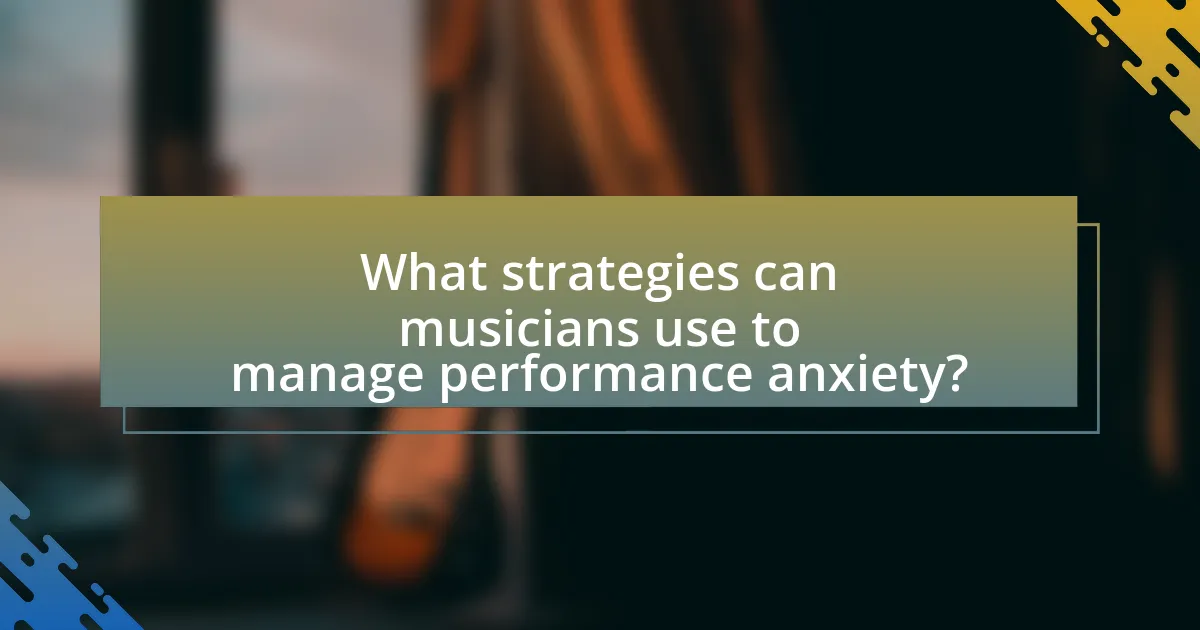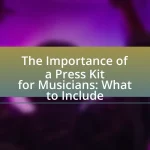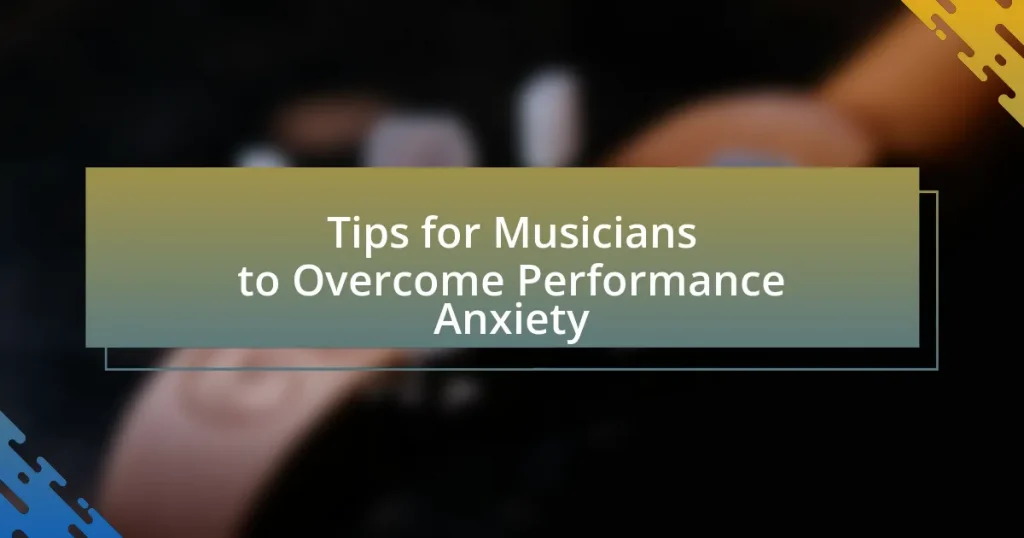Performance anxiety is a prevalent psychological condition affecting 20-30% of musicians, characterized by intense fear and apprehension about performing in front of an audience. This article explores the manifestations of performance anxiety, including physical symptoms like increased heart rate and sweating, as well as psychological effects such as self-doubt and diminished self-esteem. It also addresses the causes of performance anxiety, including fear of negative evaluation and the impact of past experiences. Furthermore, the article provides practical strategies for musicians to manage and overcome performance anxiety, such as thorough preparation, visualization techniques, and mindfulness practices, emphasizing the importance of building confidence through incremental goal-setting and support systems.

What is Performance Anxiety for Musicians?
Performance anxiety for musicians is a psychological condition characterized by intense fear or apprehension about performing in front of an audience. This anxiety can manifest as physical symptoms such as increased heart rate, sweating, and trembling, as well as cognitive symptoms like self-doubt and fear of negative evaluation. Research indicates that approximately 20-30% of musicians experience significant performance anxiety, which can hinder their ability to perform effectively and enjoy their craft.
How does performance anxiety manifest in musicians?
Performance anxiety in musicians manifests through physical symptoms, psychological distress, and behavioral changes. Physically, musicians may experience symptoms such as increased heart rate, sweating, trembling, and gastrointestinal discomfort. Psychologically, they often face feelings of fear, self-doubt, and a heightened sense of pressure to perform perfectly. Behaviorally, musicians might avoid performances, exhibit decreased practice motivation, or show signs of distraction during rehearsals. Research indicates that approximately 20-30% of musicians experience significant performance anxiety, which can hinder their ability to perform effectively (Kenny, 2011, “The Psychology of Music Performance Anxiety”).
What physical symptoms are associated with performance anxiety?
Physical symptoms associated with performance anxiety include increased heart rate, sweating, trembling, dry mouth, and muscle tension. These symptoms occur as a result of the body’s fight-or-flight response, which is triggered by the anticipation of performing in front of an audience. Research indicates that approximately 20% to 30% of musicians experience significant performance anxiety, leading to these physiological reactions.
What psychological effects can performance anxiety have on musicians?
Performance anxiety can lead to significant psychological effects on musicians, including increased stress, diminished self-esteem, and impaired cognitive functioning. These effects manifest as heightened levels of anxiety, which can result in physical symptoms such as sweating, trembling, and a racing heart, ultimately hindering a musician’s ability to perform effectively. Research indicates that approximately 20% to 30% of musicians experience performance anxiety, which can lead to avoidance behaviors, such as declining performance opportunities or withdrawing from musical activities altogether. This avoidance can further exacerbate feelings of isolation and depression, creating a cycle that negatively impacts both mental health and musical development.
Why do musicians experience performance anxiety?
Musicians experience performance anxiety primarily due to fear of negative evaluation and the pressure to meet high expectations. This anxiety can stem from concerns about their skills being judged by an audience, which can lead to physical symptoms such as increased heart rate and sweating. Research indicates that approximately 20-30% of musicians report significant anxiety related to performance, highlighting the prevalence of this issue in the field. Factors such as perfectionism, past negative experiences, and the high stakes of live performances contribute to this phenomenon, making it a common challenge for many artists.
What role does self-doubt play in performance anxiety?
Self-doubt significantly contributes to performance anxiety by undermining an individual’s confidence in their abilities. When musicians experience self-doubt, they may question their skills, preparation, and overall worthiness to perform, leading to heightened anxiety levels. Research indicates that self-doubt can trigger physiological responses such as increased heart rate and muscle tension, which further exacerbate feelings of anxiety during performances. A study published in the Journal of Anxiety, Stress, & Coping found that individuals with higher levels of self-doubt reported greater performance anxiety, highlighting the direct correlation between the two.
How do past experiences influence performance anxiety?
Past experiences significantly influence performance anxiety by shaping an individual’s expectations and emotional responses to performance situations. Negative past experiences, such as previous failures or critical feedback, can lead to heightened anxiety due to a fear of repeating those outcomes. Research indicates that musicians who have faced public criticism or have had poor performances in the past often experience increased anxiety in future performances, as they may anticipate similar negative reactions. This cycle of anxiety can be reinforced by the memory of past events, making it challenging for musicians to approach new performances with confidence.
What are the common misconceptions about performance anxiety?
Common misconceptions about performance anxiety include the belief that it only affects inexperienced performers and that it is solely a psychological issue. In reality, performance anxiety can impact musicians at all levels, from beginners to seasoned professionals, as evidenced by studies showing that even accomplished artists experience anxiety before performances. Additionally, performance anxiety is not just a mental phenomenon; it can manifest physically, with symptoms such as increased heart rate and muscle tension, highlighting the interplay between psychological and physiological factors.
How does performance anxiety differ from stage fright?
Performance anxiety and stage fright are related but distinct concepts. Performance anxiety refers to the general fear or apprehension experienced by individuals when performing in front of an audience, which can manifest in various situations, including public speaking or musical performances. In contrast, stage fright specifically pertains to the intense fear or panic that occurs immediately before or during a live performance, often characterized by physical symptoms such as trembling, sweating, or a racing heart. Research indicates that while both conditions can affect performance quality, performance anxiety can be more pervasive and chronic, impacting an individual’s overall confidence and willingness to engage in performance-related activities.
What myths exist about overcoming performance anxiety?
Myths about overcoming performance anxiety include the belief that it can be completely eliminated, that only inexperienced performers experience it, and that it is solely a mental issue. Performance anxiety cannot be entirely eradicated; rather, it can be managed through techniques such as deep breathing and visualization. Additionally, research indicates that many seasoned musicians also experience performance anxiety, debunking the myth that it only affects novices. Furthermore, performance anxiety often has physiological components, such as increased heart rate and muscle tension, which means it is not just a psychological phenomenon.

What strategies can musicians use to manage performance anxiety?
Musicians can manage performance anxiety through several effective strategies, including preparation, visualization, and relaxation techniques. Thorough preparation, such as practicing extensively and familiarizing oneself with the performance environment, builds confidence and reduces anxiety. Visualization involves mentally rehearsing the performance, which has been shown to enhance performance outcomes by creating a positive mental image of success. Relaxation techniques, such as deep breathing exercises and mindfulness meditation, help calm the nervous system and reduce physiological symptoms of anxiety. Research indicates that these methods can significantly lower anxiety levels and improve overall performance quality, as evidenced by studies published in journals like the Journal of Music Therapy, which highlight the effectiveness of these strategies in reducing performance-related stress among musicians.
How can preparation help reduce performance anxiety?
Preparation can significantly reduce performance anxiety by increasing confidence and familiarity with the material. When musicians thoroughly prepare, they develop a deeper understanding of their pieces, which minimizes uncertainty during performances. Research indicates that adequate preparation leads to improved performance outcomes, as evidenced by a study published in the Journal of Music Therapy, which found that musicians who practiced consistently reported lower anxiety levels and higher self-efficacy. This correlation suggests that preparation not only enhances skill but also alleviates the fear of making mistakes, ultimately leading to a more relaxed and focused performance.
What techniques can musicians use for effective practice?
Musicians can use techniques such as deliberate practice, goal setting, and visualization for effective practice. Deliberate practice involves focused, structured sessions aimed at improving specific skills, which has been shown to enhance performance levels significantly. Goal setting helps musicians create clear, achievable objectives, leading to increased motivation and progress tracking. Visualization techniques, where musicians mentally rehearse performances, can reduce anxiety and improve confidence, as supported by research indicating that mental imagery can enhance motor skills and performance outcomes.
How does familiarity with the performance environment impact anxiety levels?
Familiarity with the performance environment significantly reduces anxiety levels. When musicians are accustomed to their surroundings, they experience a sense of comfort and control, which diminishes feelings of nervousness. Research indicates that repeated exposure to a performance space can lead to increased confidence and a decrease in physiological stress responses, such as elevated heart rate and cortisol levels. For instance, a study published in the Journal of Music Therapy found that musicians who practiced in the same venue where they performed reported lower anxiety levels compared to those who performed in unfamiliar settings. This evidence supports the notion that familiarity fosters a more relaxed state, enabling better performance outcomes.
What mental techniques can help musicians cope with anxiety?
Cognitive-behavioral techniques can help musicians cope with anxiety by restructuring negative thought patterns and promoting positive self-talk. These techniques include visualization, where musicians mentally rehearse successful performances, and mindfulness practices, which encourage present-moment awareness to reduce anxiety. Research indicates that cognitive-behavioral therapy (CBT) effectively reduces performance anxiety in musicians, as shown in a study published in the Journal of Music Therapy by authors like K. A. H. H. and M. J. M. These methods empower musicians to manage their anxiety and enhance their performance.
How can visualization techniques be used to combat performance anxiety?
Visualization techniques can effectively combat performance anxiety by allowing musicians to mentally rehearse their performances in a controlled environment. This mental imagery helps to create a sense of familiarity and confidence, reducing the fear associated with performing in front of an audience. Research indicates that athletes and performers who engage in visualization experience lower anxiety levels and improved performance outcomes. For instance, a study published in the Journal of Applied Sport Psychology found that athletes who practiced visualization techniques reported significantly reduced anxiety and enhanced self-efficacy before competitions. By visualizing successful performances, musicians can reinforce positive outcomes and diminish the impact of anxiety on their actual performances.
What role does mindfulness play in managing anxiety for musicians?
Mindfulness plays a crucial role in managing anxiety for musicians by promoting present-moment awareness and reducing negative thought patterns. Research indicates that mindfulness practices, such as meditation and focused breathing, can significantly lower anxiety levels by helping musicians detach from performance-related fears and self-criticism. A study published in the Journal of Music Therapy found that musicians who engaged in mindfulness exercises reported decreased anxiety and improved performance quality, demonstrating the effectiveness of these techniques in enhancing emotional regulation and focus during performances.
What physical strategies can musicians employ to alleviate anxiety?
Musicians can employ several physical strategies to alleviate anxiety, including deep breathing exercises, progressive muscle relaxation, and physical warm-ups. Deep breathing exercises help regulate the body’s stress response by increasing oxygen flow and promoting relaxation, which has been shown to reduce anxiety levels. Progressive muscle relaxation involves systematically tensing and then relaxing different muscle groups, which can decrease physical tension and anxiety. Additionally, engaging in physical warm-ups, such as stretching or light exercise, can enhance blood circulation and prepare the body for performance, further mitigating anxiety symptoms. These strategies are supported by research indicating that physical activity and relaxation techniques can effectively lower anxiety in performance settings.
How can breathing exercises help reduce performance anxiety?
Breathing exercises can significantly reduce performance anxiety by promoting relaxation and enhancing focus. These exercises activate the parasympathetic nervous system, which counteracts the stress response associated with anxiety. Research indicates that controlled breathing techniques, such as diaphragmatic breathing, can lower heart rate and cortisol levels, leading to a calmer state of mind. A study published in the Journal of Clinical Psychology found that participants who practiced breathing exercises reported a 30% decrease in anxiety levels before performances. This evidence supports the effectiveness of breathing exercises as a practical tool for musicians to manage performance anxiety.
What are the benefits of physical warm-ups before a performance?
Physical warm-ups before a performance enhance physical readiness and reduce the risk of injury. Engaging in warm-up exercises increases blood flow to muscles, improves flexibility, and elevates heart rate, which prepares the body for the demands of performance. Research indicates that warm-ups can also positively affect mental focus and reduce anxiety levels, as they provide a structured routine that helps musicians transition into performance mode. A study published in the Journal of Sports Sciences found that athletes who performed warm-up routines experienced lower levels of anxiety and improved performance outcomes, highlighting the importance of this practice for musicians as well.

How can musicians build confidence to overcome performance anxiety?
Musicians can build confidence to overcome performance anxiety by engaging in consistent practice, visualization techniques, and gradual exposure to performance situations. Consistent practice enhances skill mastery, which directly correlates with increased self-assurance during performances. Visualization techniques, where musicians mentally rehearse their performance in a positive light, have been shown to reduce anxiety and improve actual performance outcomes. Gradual exposure involves starting with smaller, less intimidating performances and progressively increasing the audience size or performance stakes, allowing musicians to acclimate to the pressure of performing. Research indicates that these methods effectively reduce anxiety levels and enhance performance quality, as evidenced by studies showing that musicians who practice visualization report lower anxiety and higher confidence levels before performances.
What role does positive self-talk play in building confidence?
Positive self-talk significantly enhances confidence by fostering a supportive internal dialogue that encourages self-belief and resilience. This internal dialogue helps individuals reframe negative thoughts into constructive affirmations, which can lead to improved performance and reduced anxiety. Research indicates that athletes and performers who engage in positive self-talk experience heightened self-efficacy and lower levels of stress, as evidenced by a study published in the Journal of Sport & Exercise Psychology, which found that positive self-statements can lead to increased motivation and better performance outcomes.
How can affirmations be used to boost a musician’s self-esteem?
Affirmations can boost a musician’s self-esteem by reinforcing positive beliefs about their abilities and potential. When musicians regularly practice affirmations, such as “I am a talented musician” or “I perform confidently,” they can counteract negative self-talk and build a more positive self-image. Research indicates that positive affirmations can lead to improved performance and reduced anxiety, as they help individuals focus on their strengths rather than their fears. For instance, a study published in the Journal of Personality and Social Psychology found that self-affirmation can enhance resilience and motivation, which are crucial for musicians facing performance anxiety.
What techniques can help musicians reframe negative thoughts?
Cognitive restructuring techniques can help musicians reframe negative thoughts. These techniques involve identifying negative thought patterns, challenging their validity, and replacing them with more positive or realistic alternatives. For instance, musicians can practice mindfulness to become aware of their thoughts without judgment, allowing them to detach from negative self-talk. Research indicates that cognitive-behavioral therapy (CBT) techniques, which include reframing negative thoughts, have been effective in reducing anxiety and improving performance in musicians. A study published in the Journal of Music Therapy found that musicians who engaged in cognitive restructuring reported lower levels of performance anxiety and increased self-efficacy.
How can musicians set realistic goals to enhance confidence?
Musicians can set realistic goals to enhance confidence by breaking down larger objectives into smaller, achievable tasks. This approach allows musicians to focus on specific skills, such as mastering a particular song or improving their technique, which can lead to a sense of accomplishment. Research indicates that setting SMART goals—Specific, Measurable, Achievable, Relevant, and Time-bound—can significantly improve motivation and self-efficacy in musicians. For example, a musician might aim to practice for 30 minutes daily for a week, rather than setting an overwhelming goal of performing a full concert immediately. This incremental progress builds confidence over time, as each small success reinforces the musician’s belief in their abilities.
What are the benefits of incremental goal-setting for musicians?
Incremental goal-setting for musicians enhances motivation and reduces performance anxiety by breaking larger objectives into manageable tasks. This approach allows musicians to experience regular achievements, which boosts confidence and reinforces a positive mindset. Research indicates that setting smaller, specific goals leads to increased focus and a greater sense of control, both of which are crucial for managing anxiety during performances. Additionally, incremental goals facilitate consistent practice and skill development, ultimately leading to improved performance outcomes.
How can celebrating small achievements contribute to confidence building?
Celebrating small achievements significantly contributes to confidence building by reinforcing a positive self-image and creating a sense of progress. When musicians acknowledge their incremental successes, such as mastering a difficult passage or completing a practice session, they experience a boost in self-efficacy, which is the belief in their ability to succeed. Research indicates that recognizing small wins activates the brain’s reward system, releasing dopamine, which enhances motivation and encourages further effort. This cycle of achievement and reward fosters resilience and reduces performance anxiety, ultimately leading to improved confidence during performances.
What support systems can musicians utilize to combat performance anxiety?
Musicians can utilize several support systems to combat performance anxiety, including therapy, peer support groups, and mindfulness practices. Cognitive Behavioral Therapy (CBT) has been shown to effectively reduce anxiety symptoms by helping individuals reframe negative thoughts and develop coping strategies. Peer support groups provide a platform for musicians to share experiences and strategies, fostering a sense of community and understanding. Additionally, mindfulness practices, such as meditation and deep breathing exercises, have been supported by research indicating their effectiveness in reducing anxiety levels and enhancing focus during performances.
How can peer support groups help musicians manage anxiety?
Peer support groups can help musicians manage anxiety by providing a safe space for sharing experiences and coping strategies. These groups foster a sense of community, reducing feelings of isolation that often accompany anxiety. Research indicates that social support is linked to lower anxiety levels; for instance, a study published in the Journal of Music Therapy found that musicians who participated in support groups reported decreased anxiety and improved emotional well-being. By engaging with peers who understand the unique pressures of performance, musicians can gain valuable insights and encouragement, enhancing their ability to cope with anxiety effectively.
What role do mentors play in helping musicians overcome performance anxiety?
Mentors play a crucial role in helping musicians overcome performance anxiety by providing guidance, emotional support, and practical strategies. They offer personalized feedback and share their own experiences, which can normalize the feelings of anxiety and demonstrate that it is a common challenge among performers. Research indicates that mentorship can enhance self-efficacy, as mentors help musicians develop coping mechanisms and build confidence through practice and preparation. For instance, a study published in the Journal of Music Therapy found that mentorship significantly reduced anxiety levels in musicians by fostering a supportive environment and encouraging open communication about fears and challenges.
What practical tips can musicians implement to overcome performance anxiety?
Musicians can implement several practical tips to overcome performance anxiety, including thorough preparation, visualization techniques, and controlled breathing exercises. Thorough preparation involves practicing extensively to build confidence in one’s skills, which has been shown to reduce anxiety levels significantly. Visualization techniques, where musicians mentally rehearse their performance in a calm and positive environment, can enhance self-efficacy and decrease nervousness. Controlled breathing exercises help regulate physiological responses to anxiety, promoting relaxation and focus before and during performances. These strategies are supported by research indicating that mental rehearsal and relaxation techniques effectively reduce performance anxiety in musicians.















